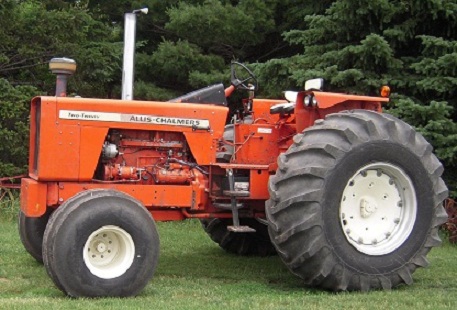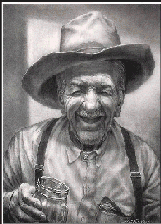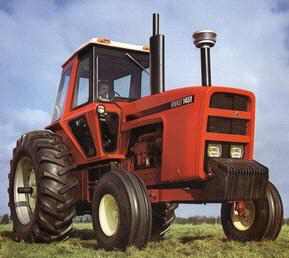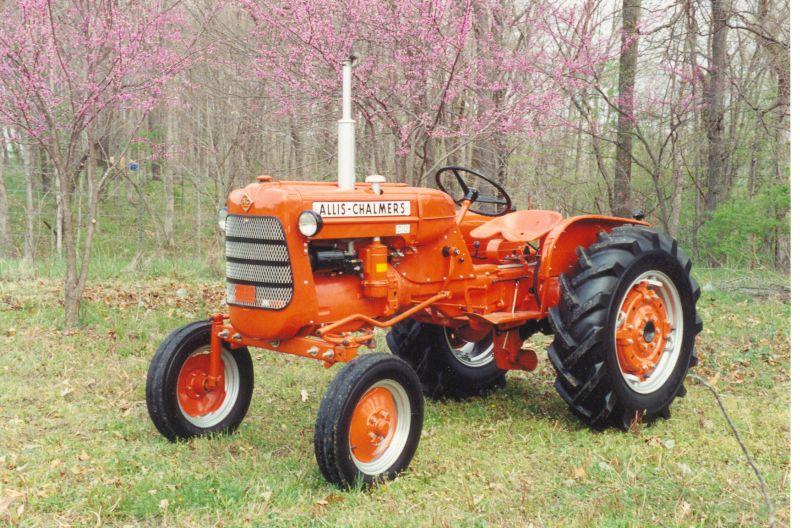| Author |
 Topic Search Topic Search  Topic Options Topic Options
|
DanD 
Orange Level

Joined: 11 Sep 2009
Location: WI
Points: 856
|
 Post Options Post Options
 Thanks(0) Thanks(0)
 Quote Quote  Reply Reply
 Topic: Why two thermostats? Topic: Why two thermostats?
Posted: 20 Sep 2012 at 5:19pm |
|
Since the largest AC tractor I've ever really worked with or on is a 185, I'm not real informed about the larger tractors. A farmer told me today that his 7045 has two thermostats, and that the coolant flows from one thermostat to the other. I couldn't really see any reason for that, so I looked it up on the AGCO parts website and it shows two thermostats, but basically it looks like a parallel circuit. The coolant flows through one thermostat or the other. What is the purpose of having two thermostats? Just trying to ensure that if one sticks shut the engine won't overheat? But of course if one is stuck shut, then the other one fail in the same way, you'll still have an overheated engine. Anyone know the reason for this design? Do all 426 engines have this? How about the big 8550 or 4W-305 engine. Thanks
|
 |
|
Sponsored Links
|
|
 |
DanD 
Orange Level

Joined: 11 Sep 2009
Location: WI
Points: 856
|
 Post Options Post Options
 Thanks(0) Thanks(0)
 Quote Quote  Reply Reply
 Posted: 20 Sep 2012 at 5:30pm Posted: 20 Sep 2012 at 5:30pm |
|
I spent more time at AGCO parts book and now see that everything from the 7010 to the 4W-220 (including the 301 engine in the 7010, 7020, and 8010) had two thermostats. It still leaves the question as to why. I see the big engine in the 8550 and 4W-305 have a big water manifold with a single large thermostat in it.
|
 |
AlVee 
Silver Level


Joined: 12 May 2011
Location: Iowa
Points: 271
|
 Post Options Post Options
 Thanks(0) Thanks(0)
 Quote Quote  Reply Reply
 Posted: 20 Sep 2012 at 6:52pm Posted: 20 Sep 2012 at 6:52pm |
|
I would say volume and safety for a sticking thermostat other wise they would have had to design a new thermostat to handle the volume of flow they wanted. Just a guess.
|
 |
DanD 
Orange Level

Joined: 11 Sep 2009
Location: WI
Points: 856
|
 Post Options Post Options
 Thanks(0) Thanks(0)
 Quote Quote  Reply Reply
 Posted: 20 Sep 2012 at 6:58pm Posted: 20 Sep 2012 at 6:58pm |
|
Well, they already had a single thermostat setup on the 220 tractor and on the 7000 tractor so they already had a single thermostat setup with the required flow for the turbocharged 301 or 426 engine. The two thermostat setup was a new design.
|
 |
Joe(TX) 
Orange Level


Joined: 11 Sep 2009
Location: Weatherford. TX
Points: 1682
|
 Post Options Post Options
 Thanks(0) Thanks(0)
 Quote Quote  Reply Reply
 Posted: 20 Sep 2012 at 8:24pm Posted: 20 Sep 2012 at 8:24pm |
|
They are and parallel and do not flow one to another. 2 thermostats, twice the flow. I used a 180 and a 190 thermostat. It allows the 2nd to open only if additional cooling is needed.
|
|
1970 190XT, 1973 200, 1962 D-19 Diesel, 1979 7010, 1957 WD45, 1950 WD, 1961 D17, Speed Patrol, D14, All crop 66 big bin, 180 diesel, 1970 170 diesel, FP80 forklift. Gleaner A
|
 |
Orange Blood 
Orange Level


Joined: 29 Nov 2010
Location: ColoradoSprings
Points: 4053
|
 Post Options Post Options
 Thanks(0) Thanks(0)
 Quote Quote  Reply Reply
 Posted: 20 Sep 2012 at 9:32pm Posted: 20 Sep 2012 at 9:32pm |
Hey dan,
You are correct in that the lower HP engines of the 426 casting had only one thermostat. But more HP = more Heat in the coolant, so flow must be inclreased in order to compensate. Not only more heat from combustion coming through the cylinder walls, but in the 7020, 7045, 7060, and 7080 they were intercooled, so now you are adding heat from the air charge into the coolant as well, and it has to freely get to the radiator for it to be disapaited. Hope this helps.
|
|
Still in use:
HD7 WC C CA WD 2-WD45 WD45LP WD45D D14 3-D17 D17LP 2-D19D D19LP 190XTD 190XTLP 720 D21 220 7020 7030 7040 7045 3-7060
Projects: 3-U UC 2-G 2-B 2-C CA 7-WC RC WDLP WF D14 D21 210 7045 N7
|
 |
DanD 
Orange Level

Joined: 11 Sep 2009
Location: WI
Points: 856
|
 Post Options Post Options
 Thanks(0) Thanks(0)
 Quote Quote  Reply Reply
 Posted: 20 Sep 2012 at 11:14pm Posted: 20 Sep 2012 at 11:14pm |
|
So it was easier to use two thermostats and design and build a new housing instead of just a single larger thermostat? Wouldn't have to make a thermostat much larger to flow twice as much coolant since the cross sectional area increases with the square of the radius (for example a thermostat 2.8" across should flow twice as much coolant as one 2" across).
Anyway, this isn't a big deal. I just found this out today and was just wondering to myself why they used two parts instead of one.
|
 |
Gerald J. 
Orange Level

Joined: 12 Sep 2009
Location: Hamilton Co, IA
Points: 5636
|
 Post Options Post Options
 Thanks(0) Thanks(0)
 Quote Quote  Reply Reply
 Posted: 21 Sep 2012 at 12:14am Posted: 21 Sep 2012 at 12:14am |
|
JD 4010 and 4020 350 gas and up and up to 404" diesel used two thermostats. Probably later ones also, I don't know about them.
They used two probably for flow because they found two common thermostats (and they are not specials) were far easier to buy and to stock than a large special.
Thermostats tend to not open the whole cross section, but just a ring around the edge of the valve disc or plate that opens just maybe an 1/8" to 1/4". So for the same valve plate rise, doubling the diameter of the valve plate only doubles the opening area, but for the operating motor to hold it closed against pump pressure it has to be 4 times as strong because the valve plate has four times the area when the valve plate is doubled in diameter. For the available mechanisms in the 1960s and 1970s that may have been an impossible task.
Gerald J.
|
 |
TexasAllis 
Silver Level


Joined: 14 Sep 2009
Location: Texas
Points: 396
|
 Post Options Post Options
 Thanks(0) Thanks(0)
 Quote Quote  Reply Reply
 Posted: 21 Sep 2012 at 7:47am Posted: 21 Sep 2012 at 7:47am |
|
Having worked with design engineers for many years it likely took just as much R&D to design a double unit versus a single larger unit. The larger unit would likely necessitate a custom t-stat where the double unit could use a common off the shelf version.
Edited by TexasAllis - 21 Sep 2012 at 7:50am
|
|
1944 Allis C
1960 Allis D-17 LP
|
 |
wbecker 
Orange Level


Joined: 29 Oct 2009
Location: STL
Points: 837
|
 Post Options Post Options
 Thanks(0) Thanks(0)
 Quote Quote  Reply Reply
 Posted: 21 Sep 2012 at 9:46am Posted: 21 Sep 2012 at 9:46am |
I think my old 239ci flathead Ford, and 255ci flathead mercury had separate left and right side block cooling system.
Bill B
|
|
Allis B, IB, Low B, G, D10, JD M, 8KCAB, C152
|
 |









 Topic Options
Topic Options

 Post Options
Post Options Thanks(0)
Thanks(0)






